Collaborate with us

Scientific collaboration at every level
Scientific collaboration is a key part of French and European research strategies and helps galvanise international partnerships.
INRAE’s involvement in the regional higher education and
research ecosystem in France (ESR)
INRAE is involved in regional schemes set up by the French government to create internationally renowned centres : academic partnerships policy and Investments for the Future programme (PIA).
> Academic partnerships policy
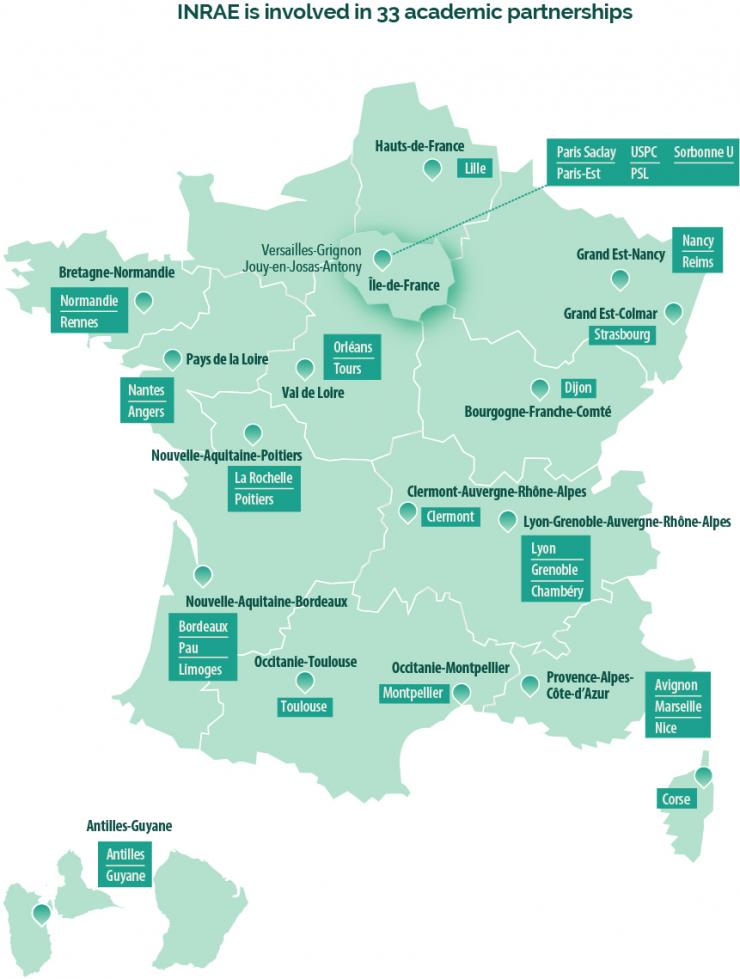
INRAE is an integral part of France’s National Research and Innovation Strategy (SNRI) and its academic partnership policy. These partnerships with academic stakeholders are regional ecosystems that bring together universities, engineering and veterinary schools, and research institutes in order to coordinate their research, teaching and innovation activities and to pool their resources and skills. INRAE’s partnership strategy and involvement with higher education and research stakeholders are managed at a national level and implemented by all INRAE centres based on their specific research priorities and fields. It allows INRAE to collaborate with many different public and private research stakeholders in its research fields.
> Investments for the Future programme
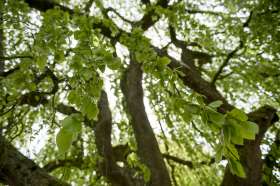
In 2019, INRAE was involved in six Idex; six I-SITES; nine EURs; 34 LabEx,
including two for which INRAE is the managing institution (ARBRE and
TULIP); seven Territoires d’innovation, including two projects led by INRAE;
five Convergence Labs, including one project led by INRAE (#DIGITAG);
eight Research Infrastructures, including three led by INRAE; seven EquipEx, including one led by INRAE (Xyloforest); two Industrial biotechnology catalyst led by INRAE (TWB and Metagenopolis); two 3IAs.
To further support the coordination, pooling of resources and international reach of research, the French government has invested public and private research and development stakeholders working together on regional projects through Investments for the Future programme (PIA) since 2010. These “projects of excellence” include various structures, such as Idex, EquipEx, I-Site, EUR, Convergence Labs, Territoires d’innovation. They issue calls for projects to which INRAE submits proposals as a project partner or coordinator. These initiatives support the creation of projects and large regional hubs with an international reach. In France, the Saclay and Montpellier sites, with which INRAE is partnered, have already acquired strong visibility on the international stage.
National alliances
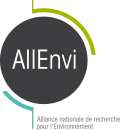
INRAE is a founding member of the Allenvi alliance for environmental research. This alliance represents France in six related Joint Programming Initiatives (JPIs): FACCE JPI (read the article), Water JPI, Oceans JPI, Climate JPI, Urban Europe JPI and HDHL JPI (on food systems). INRAE is a founding member of the Aviesan alliance on health and is a partner of the following alliances: Athena (humanities and social sciences), Ancre (energy), and Allistene (digital technology). The national research alliances were created in 2010 to coordinate the research programmes of national organisations by theme and represent France in the European research ecosystem. They lead the research groups and are involved in creating the French National Research and Innovation Strategy (SNRI).
Europe and the World
Tackling the challenges of food security, sustainable agriculture and climate change now requires a systemic approach on a global scale. These issues are included in the Sustainable Development Goals outlined in the 2030 Agenda adopted by the UN in 2015.
With its considerable experience in regional, national and international systems, INRAE is involved in multiple European and international partnerships.
An innovation strategy based on partnerships and technology transfer
Innovation is supported by a partnership strategy that connects the Institute with socio-economic stakeholders and seeks to foster job creation.
To discover our partnership research opportunities and contact our Partnership and Innovation Officers, go to
To see our technology transfer options and contact our Technology Transfer Officers, go to
As a public targeted-research organisation, INRAE produces scientific knowledge related to its research goals and is involved in sharing and using the results and lessons learned from this research. More specifically, it works to ensure this scientific knowledge has a tangible impact across society in two ways: by supporting public policies and private stakeholders, industry professionals and associations; and by contributing to all types of innovation, from new products to services, uses, technology, processes, organisational structures and business models. These innovations may also have social, marketing or commercial applications.
Our innovations are the result of highly diversified partnerships with research organisations, educational institutes, agricultural schools and agroindustrial institutes, chambers of agriculture, competitiveness clusters, public and private economic stakeholders, and civil society organisations. INRAE’s partnerships foster co-construction of the value creation process between all stakeholders along the chain
A partnership offer organised by field
Our strategy is organised around 15 fields with high innovation potential and 4 Carnot Institutes that cover our three research areas of agriculture, food and the environment.
Helping researchers through every step of the innovation process
In addition to setting up the partnership offer, INRAE encourages and supports researchers to pursue their work with innovation in mind.
Partnerships with all socio-economic stakeholders
INRAE has partnerships with more than 450 socio-economic stakeholders, businesses, associations, regional authorities and more. Annual income from these research partnership contracts totals €30.9.
The impacts of our research
INRAE has developed a methodology for analysing the societal impacts of its research. This methodology called ASIRPA ( Socio-economic Analysis of Impacts of Public Agronomic Research) looks at five different areas: the economy, the environment, public policies and regulations, and society and health. This approach has been applied to around 60 innovation case studies and has shown that the impacts of agricultural research can be felt within 15 to 20 years. See the ASIRPA site.

INRAE’s research often has a direct impact on our daily lives. This impact is not only significant in economic terms, but from an environmental, policy and public health standpoint as well. Using the methodology developed through the ASIRPA project, the Institute can now measure these impacts.
INRAE’s work for open science
Open science is a movement that aims to involve new stakeholders, such as everyday citizens and non-research organisations, in the research process, and to make the products of research — everything from scientific publications and data to software programs — more accessible and reusable for the scientific community and for society at large. INRAE’s work for open science includes expertise and support for policymaking, participatory science and research, open innovation measures (living labs, Innovation Regions programme) and the dissemination of research findings, both in terms of publications and research data, using digital resources.
Expertise and public policy support
Climate change, depletion of resources, deterioration of the environment and urbanisation, etc. are all transforming the world; there is a growing need for scientific diagnosis and anticipation from the local to the global scales. Society’s expectations regarding these issues reinforce demands to feed public debate. Our expertise contributes to the development and implementation of international agreements such as the Paris Climate Agreement or the United Nations Sustainable Development Goals (SDGs), as well as to European Directives, national plans or more local policies. Our work also contributes to informing society and public decision-makers and managers so that they can develop and support appropriate and efficient policies.
Benefiting from proven methodologies and reference studies, INRAE works closely with ministries, regional government bodies or European and international institutions to provide:
- Information for stakeholders and public debate, based on collective scientific expertise, studies and foresight;
- Assistance with the design of public policies through ex ante and ex post analyses and evaluations;
- Support for the implementation of public policies using methodological tools, references and databases.
This provision of expertise and support for public policies is central to INRAE’s missions; it mobilises its scientific and innovation strengths while at the same time raising new questions.
A few examples of expert studies:
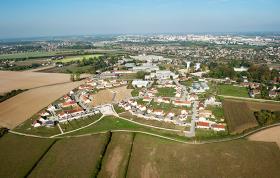
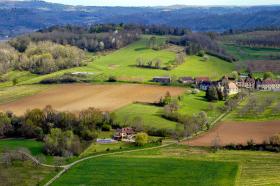
More information about expert studies and support for public policies
Fostering dialogue with society
INRAE is resolutely committed to engaging with society. Our aim is to conduct research with and for society, contribute to research issues, disseminate the knowledge produced and provide forums for debate and controversy.
Participate in our research
We develop many citizen science initiatives that call on non-scientists (citizens, consumer organisations, elected officials, farmers, environmental protection associations, industry professionals, etc.) to be actively involved in knowledge production. Various types of citizen participation exist, from basic data collection to the development of research issues.
Example:
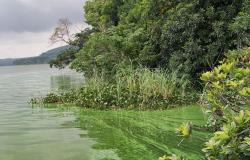
In the context of setting up a long-term surveillance system for the Aghien Lagoon, the WaSAf project has developed a citizen science app which can be used by the communities situated on the shores of the lagoon.
Website on participatory research (IN FRENCH)
Learn, understand, debate
INRAE is strongly committed to disseminating the knowledge produced by research. The Institute has an array of tools at its disposal to do this: a website for the general public, ties with the media, partnerships with scientific culture and technology stakeholders with whom we produce exhibitions and educational kits and organise events that contribute to links with society (Fête de la science, Nuit des chercheurs, My Thesis in 180 Seconds, etc.).
INRAE also offers forums for debate where citizens can be heard and voice their concerns on controversial issues. For example, Agrobioscience and the journal it publishes, Sésame, allow people to “start a controversy” and encourage debates on ideas by bringing together various positions on social issues. Finally, Quae, the publishing house founded by INRAE, CIRAD and IFREMER, works to share knowledge and participate in the public debate.
Open research infrastructures
INRAE has 14 research infrastructures (RIs) and an e-infrastructure that is under development. From observatories to biological resource centres, technological platforms and more, these infrastructures offer scientific communities access to data production and management, technological development, training and innovation. Disseminating data and making it openly available are vital requirements for all of INRAE’s initiatives in order to support Open Science.
These RIs, to which INRAE allocates a third of its overall annual budget and nearly 1,800 full-time equivalent positions, reflect INRAE’s key research areas. They participate in various programmes in cooperation with other RIs or within national and European RIs.
Key figures
More than 450 socio-economic partners
> €30.9 m in revenue
> €9.1 m royalties received from patents, expertise, software and plant variety
rights
> 5 Carnot Institutes
> 156 new declarations of invention and exploitable results
> 97 new licences for patents, expertise, software and plant variety rights
> 143 start-ups created in conjunction with INRAE since 1999
